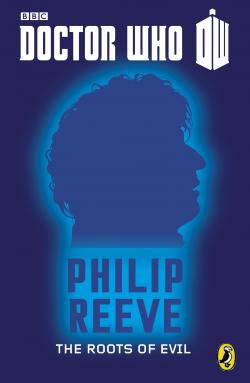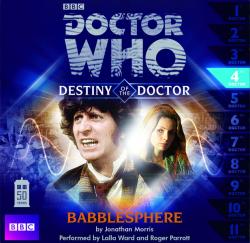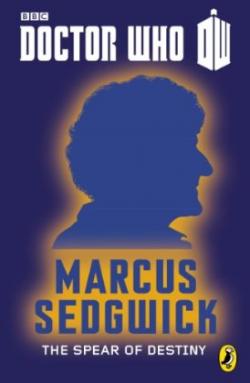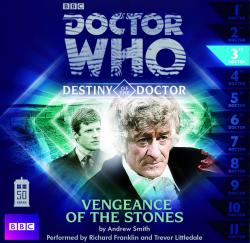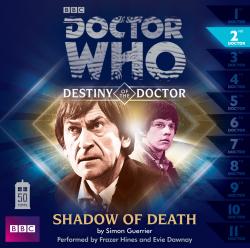Destiny of the Doctor: Smoke and Mirrors
Monday, 6 May 2013 - Reviewed by
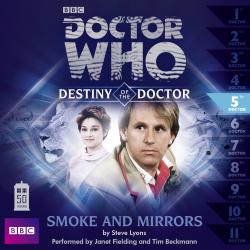
Destiny of the Doctor: Smoke and Mirrors
Released by AudioGo
Produced by Big Finish
Written by Steve Lyons
Directed by John Ainsworth
Released: May 2013
“Number Five- oh, I remember being you. So young, so breathless with energy, come to think of it, a bit grumpy too, a bit frowny, a bit worried about not being listened to...”
Here we are, then - halfway out of the dark. Well, to be fair that paints a rather pessimistic visage of the Destiny Of The Doctor 50th Anniversary range from AudioGo, which so far has been nothing short of spectacular. Sure, the range has had its peaks and troughs just as any ongoing monthly audio series would, but above all there’ve been a number of compelling plot arc elements making each new instalment well worth a listen. Does the fifth entry, Smoke And Mirrors, follow the tradition of keeping in tune soundly with the tone of its respective era? Without a shadow of a doubt, once again the Doctor-era in question- here the Peter Davison years - has been represented magnificently here, with much of the wonder for the Fifth Doctor waiting to be found across the planet Earth rather than always in the stars as his immediate predecessor would wager. Peter Davison remains perhaps this reviewer’s most treasured classic Doctor, and thus to see his era on the show done such justice here is a truly heart-warming experience (to the ears, in this case!).
That Janet Fielding joins AudioGo for the ride this time around certainly helps in this respect. Janet’s Tegan was always a feisty one, her Australian accent and outspoken nature bearing an influence even today in the realms of Doctor Who- we only need look to that oh-so-nostalgic throwaway reference to the character in Saturday’s The Crimson Horror for proof of that. It’s no easy task for Janet to inhabit the roles of Davison’s Doctor, Sarah Sutton’s Nyssa, Matthew Waterhouse’s Adric and of course her own companion character, so it’s testament to her ability as a vocal actress that such a feat appears, at least on the surface, to have been pulled off with ease and flair. It will be difficult for fans of the Davison years not to feel themselves being immersed once again in the days of cricket bats, battles of wits against Anthony Ainley’s Master and the immense physicality which the new lead brought to the role.
Unsurprisingly, in the latest issue of Doctor Who Magazine, writer Steve Lyons notes that there often wasn’t a ‘definitive’ tone to the Davison era, making the placement of Smoke And Mirrors in non-chronological season terms a little more difficult. Indeed, the excursion that the Doctor, Nyssa, Tegan and Adric make to see none other than Mr Harry Houdini in 1920s England in many ways feels more befitting of the Season 19 days of The Visitation and Black Orchid than it does Season 21’s Planet of Fire and The Caves of Androzani. All the same, the interaction between the leads of the time with Tim Beckmann’s sly Houdini feels spot on in terms of replicating what we might have seen had this story been broadcast on BBC1 back in the ‘80s. There are effective layers of intrigue and fantastical mystery to each element of the tale, not always explained yet still feasible within the science-fiction genre, as has always been the case for even the most whimsical Who outings.
That said, despite the tonal and cast strengths of this fifth entry, there are one or two notable shortcomings. Whereas last month’s Babblesphere managed to provide a innovative satirical plot on top of its era-accurate representations, it feels as if one or two of the ambitious setpieces boasted in this particular storyline would have been better suited in a visual form whereby the listener/viewer was able to feel emphatically the tension and thrills of certain setpieces, instead of simply being left to the imagination in instances where even the classic series’ occasionally ropey CGI might have better served proceedings. It’s more of an overall gripe that can arise with the AudioGo franchise as a whole in terms of what we seen in Doctor Who’s televised adventures on a weekly basis, yet in the case of Smoke And Mirrors it still proves to be a point of ‘failure’ significant enough to warrant highlighting before fans race to stores expecting an audio tour de force which bests all of its on-screen rivals.
In addition, while this flaw appears to be a common point of irritance as the arc of Destiny progresses, it’s important to note that the latest fleeting cameo from Matt Smith’s Eleventh Doctor (voiced by the lead, Janet here, as always) still leaves more than a little to be desired. While it’s clear that November’s The Time Machine should, with luck, provide a satisfying resolution to the requests that our current incarnation of the Time Lord is making to his former selves, for now despite the variety of manifestations the character uses to communicate, there’s a lingering sense of repetition about it all. With any luck, that the Sixth Doctor is called upon in next month’s entry Trouble In Paradise by his future self to investigate a mystery should provide a different spin on proceedings, for now it’s impossible to call the standard deviation arc scene anything more than a disjointed distraction in the context of Smoke And Mirrors.
This much is clear of Destiny of the Doctor from what we’ve heard so far, though: short of any disasters in the range from here on out, this is a range that’s sure to be remembered as a fitting tribute to Doctor Who in the midst of its 50th Anniversary. Working in tandem with the infinite number of books, eBooks, classic DVDs, new DVD boxsets, audio dramas, Proms, conventions, docu-dramas, Culture Show tributes, Pointless editions, board games and other merchandise coming our way this year, not to mention the blockbuster season of new episodes we’re currently watching and the promise of two truly spectacular Anniversary and Christmas Specials to round off the year, Destiny seems to be skilfully blending together all of the components which have made this sci-fi legend such a hit over the past half-century. Halfway out of the dark, then? Nope- we’re simply halfway into the light, and things can only keep getting brighter from here on out…
